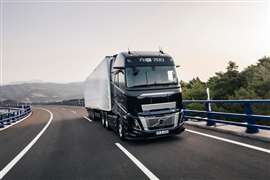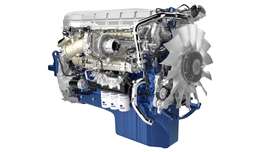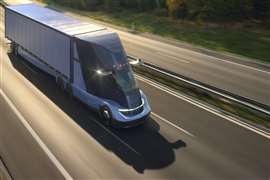Street Smarts: Volvo’s highway horsepower green diesel
20 June 2024
Company says its brand-new 700-hp diesel engine is good for the environment
 New truck length and weight laws in Sweden have spurred Volvo to develop an all-new, high-horsepower diesel engine. (Photo: Volvo)
New truck length and weight laws in Sweden have spurred Volvo to develop an all-new, high-horsepower diesel engine. (Photo: Volvo)
Naturally, a trip to Volvo’s home city of Gothenburg, Sweden, is going to be packed with presentations on zero-emission vehicle technology. Environmentalism has always been one of the Swedish truck and engine OEM’s core values. And no other engine manufacturer on the planet has embraced the fight against climate change quite as enthusiastically as Volvo has.
So, when you hear that the OE just released a brand-new, 700-hp truck engine, it’s understandable if you’re confused.
But as I noted last month in Street Smarts, Volvo sees a bright future for internal combustion engines and, in the short term, for diesel engines running on renewable diesel fuel. The OEM believes that even high-horsepower diesel engines can contribute to trucking’s quest to be a net-zero emissions industry by 2050 – if deployed correctly and in the right applications.
Bigger, cleaner, greener, leaner
The new Volvo D17 is the largest diesel engine ever put under the cab of a Volvo truck. And it’s the most powerful, too.
The engine is available in three versions: 600 hp, 700 hp and the heavyweight champ 780-hp option. These engines churn out an incredible 2,212, 2,507 and 2,802 lb.-ft. of torque, respectively.
 The D17 engine takes advantage of the latest diesel technology. The result is a lighter, cleaner, more fuel-efficient engine than its predecessor. (Photo: Volvo)
The D17 engine takes advantage of the latest diesel technology. The result is a lighter, cleaner, more fuel-efficient engine than its predecessor. (Photo: Volvo)
Volvo leveraged the latest diesel engine technology, including the OEM’s patented WAVE combustion technology to deliver an engine that gives drivers faster, more precise throttle response and – yes, Virginia – improved fuel economy compared to the D16 diesel it replaces. It also weighs less than the D16, too.
Other upgrades include a new fuel injection system that aids in providing optimal fuel economy, while increased peak cylinder pressure enables high power output.
D17 engine brake power has also been increased across the entire speed range. This enables fast gear shifts and results in less wear and tear on the brake pads and disc brakes while being more efficient going downhill.
Volvo also fine-tuned its I-Shift automated transmission to deliver faster upshifts and downshifts. Fast shifts are critical when pulling heavy loads like combination trailers. But these enhancements also deliver a smoother ride and make the most efficient use of engine power possible while contributing to enhanced fuel efficiency.
The D17 is certified to run on biodiesel in all power ratings. Additionally, the 700-hp version is also certified to run on 100% biodiesel (B100).
Taken as a whole, the D17 is a low-emissions, high fuel economy option for diesel fleets running in Europe now. As such, the OEM sees the new engine as wholly in line with its zero-emission mission. Unfortunately, Volvo is not planning to offer the D17 as an option in North America right now.
Mini road trains and renewable diesel fuel
Of course, every engine manufacturer needs a high-horsepower engine in its lineup for severe-duty and high-capacity applications. But there’s another significant driver behind the development of the D17 – new tractor-trailer length and weight laws in Sweden.
Under new regulations, which went into effect on Dec. 1, 2023, it is now legal to run combination trailers totaling 113 ft. (34.5 m) in length and up to 100 tons (93 tonnes) GCW on mandated Swedish highways.
The Swedish government calculates that using these longer and heavier combinations can reduce energy consumption by up to 30% for individual vehicles and by 4% to 6% overall. These figures hold true for BEVs, hydrogen fuel cells and biofuel and diesel engines, as well.
 Jack Roberts is a Tuscaloosa, Ala.-based independent journalist and licensed commercial driver with more than 20 years’ experience covering the North American and global trucking industries.
Jack Roberts is a Tuscaloosa, Ala.-based independent journalist and licensed commercial driver with more than 20 years’ experience covering the North American and global trucking industries.
More to the point, Volvo’s truck engineers note that one 34.5 m tractor-trailer can haul as much freight as two to three conventional tractor-trailer rigs, with equivalent reductions in NOx emissions and fuel consumption. That means fewer greenhouse gas emissions, less fuel burned and fewer trucks on the road.
For now, Sweden is limiting 34.5-m tractor-trailer combinations only on its safest and most modern highways – approximately 5,000 km in total. But I think the Swedes are on to something. This “mini road train” concept is one that I think would work very well here in North America. Running longer combinations that can take three conventional, 53-ft. tractor-trailers off the road makes a lot of sense from environmental, fuel efficiency and congestion points of view.
And those benefits could be increased substantially if those trucks – limited to interstate highways – were running on renewable diesel fuel and under autonomous control.
The reality is that diesel fuel is going to be in the mix for some time to come. In my opinion, it’s time to take a fresh look at diesel fuel, along with new and innovative ways of using it. By doing so, we can make significant strides toward saving the planet while making sure freight keeps moving.





